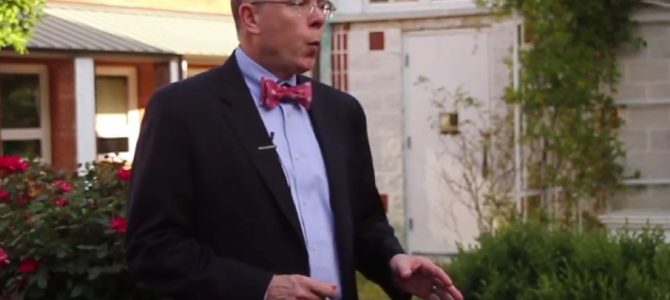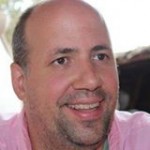
In February of last year, well on her way toward cementing her reputation as the worst presidential candidate in modern history, Hillary Clinton did a Facebook Q&A where she was asked to address college-age voters. Naturally, she proceeded to dole out some pretty questionable advice: “Most of all, do what you love. Don’t take a job just for money.” Few people have that luxury. As anyone who has spent any time, say, browsing Etsy, can attest, most of the time not enough people can earn a decent living doing what they love most.
Case in point: Chris Ullman is beloved as a family man and a member of his community, and he’s a wildly successful professional. When he hasn’t been otherwise occupied teaching inner-city kids or circumnavigating the country on a motorcyle, he’s built quite a career working in the House of Representatives, Senate, Securities and Exchange Commission, and the White House. Currently, he rubs shoulders every day with billionaires as director of global communications for the Carlyle Group, one of the largest private equity firms in the country.
But to people besides his friends and family, none of these accomplishments are why Ullman is especially noteworthy. As Ullman himself notes, “one of my Carlyle colleagues once said to me, ‘Unless you cure cancer someday, you’ll always be known as the whistler.’”
An Unusual Calling Card
Of course, Ullman isn’t just a whistler; he’s a four-time world champion whistler. (It turns out there’s an annual competition in North Carolina.) Of all the things you could be best in the world at, whistling may seem like a silly skill to possess. But if you’ve ever heard Ullman pucker up and run through “Vesti la giubba” from the opera “Pagliacci” or Duke Ellington’s “Take the A Train,” it’s undeniably impressive.
However, in his new book, “Find Your Whistle,” Ullman explains that not everyone loves what he does. Being an expert whistler is such an unusual calling card that even after explaining that he’s performed with the National Symphony Orchestra, appeared on “The Tonight Show,” and whistled for the president, people still turn down his offers to perform.
Not that this has slowed Ullman down. Ultimately, “Find Your Whistle” is a book about what to do when the world doesn’t necessarily appreciate or understand your gifts, and what you can do to make an impact and better others’ lives when your gifts don’t necessarily lend themselves to a full-time job. Ullman’s example is inspiring precisely because, for most people, “do what you love” has never been easy, simple, or lucrative. And Ullman has managed to do it anyway.
Hard Work and Skill Maximization
Accordingly, Ullman’s book is part memoir, part advice manual, although the proceedings are shot through with liberal doses of humility. But there are several lessons here to be drawn from a life spent whistling. In particular, Ullman illustrates that if you have a natural talent and enthusiasm for doing something, you should cultivate it and work at it until you achieve excellence.
For this insight he credits his father: “My father’s perennial question upon learning of a loss was: ‘Did you try your hardest?’ He was less impressed by victory at all cost and more interested in hard work and skill maximization. Did I use the gifts God had given me to the fullest extent…or did I fritter them away?”
When it came to whistling, he took his father’s words very much to heart. He spent his childhood whistling tunes from classical records that his parents had purchased. He became known throughout his neighborhood for his whistling, because he had a paper route and literally didn’t know how to not whistle while he worked.
For a lot of people, doing something for your own enjoyment might be enough. But even though whistling has never been—and likely never will be—Ullman’s primary job, that hasn’t stopped him from putting in the effort to realize the full potential of his gift. When Ullman first started competing, Ullman reports he even lost a job in part because he was obsessively preparing for the whistling championship. However, he’s also learned that you can be dedicated to something and still balance practical responsibilities. After Bill Gates heard him hearing him perform at a wedding, Ullman recounts that he “casually asked, ‘Do you have a real job?’ I suspect the notion of someone able to sustain himself as a whistler did not compute in his logical brain.”
Unselfish Motivations
Another valuable lesson: a major reason Ullman became a truly great whistler is he had unselfish motivations. Ullmann saw that whistling was a way to connect with people. The better he was at whistling, the more people he connected with. “I sensed that my whistle was a special gift that was going to do unexpected things and expose me to new experiences,” he writes.
He relates a story about how, as a younger man, he realized he was getting good at whistling when he was approached by a man at a grocery store who appreciatively identified the particular passage of a Beethoven symphony Ullman was whistling. While there undoubtedly was some real admiration for his ability, ultimately the two men connected because they shared the same love of music.
Another particularly affecting story Ullman relates is about being contacted by the mother of a developmentally disabled boy who loved whistling. Ullman came over and whistled his patented “Happy Birthday” whistle, full of trills and flourishes, for him at his mother’s request. But that’s not the end of the story. The next year on the boy’s birthday, Ullman remembered to call him and whistled “Happy Birthday” for him. The boy’s family was so touched that Ullman remembered him, they have subsequently become close friends and Ullman has gotten involved with the boy’s school for developmentally disabled kids.
Ultimately, this has led Ullman to grow as a person and help overcome a cultural divide most of us never even think about. “It’s not just blacks and whites who very much live and socialize apart from each other, though I see some progress in these areas. The able-bodied and disabled are also very much segregated,” he writes.
Put Yourself Out There
Finally, Ullman makes it clear that you can’t expect that the world will show up at your doorstep even if you’re the very best at what you do. Ullman believes, not incorrectly, that his whistling is a small contribution to making the world a better place. If you have a gift that can make people happy, why not share it as often as you can?
In this respect, Ullman really puts himself out there. Suffice to say, Ullman doesn’t get to perform on “The Tonight Show” every night. Nonetheless, he’s made whistling a daily celebration for him and those close to him. His iPhone calendar looks as busy as the Kardashians’ nightclub promotion schedule. Ullman keeps track of literally thousands of birthdays of family, friends, and acquaintances, and every day he makes a number of calls where he whistles “Happy Birthday” for them or into their voicemail.
“To me, life is the most precious gift we have, so acknowledging it is important, and birthdays are the perfect excuse,” he writes. “Sending a card or calling people on their birthdays is a wonderful way to show those people that they matter, that their presence on this earth is a good thing, that you are glad they were born.”
Of course, whistling still remains a novelty, and Ullman is the first to admit being able to make a high-pitched, reedy sound that traverses two-and-a-half octaves isn’t in and of itself what moves people or enriches his life. When Ullman urges readers to “find their whistle,” he’s really talking about how he hopes others can find their own vehicle for expressing the care and dedication they feel toward their fellow man.
This is why whistling provides him true satisfaction. “Walking the few blocks to my Capitol Hill home after the concert, I heard lots of people whistling the tune they had just learned,” he writes of his performance with the National Symphony Orchestra. “They were happy… and that made me happy. That’s why I whistle.”









